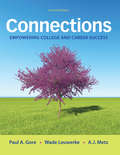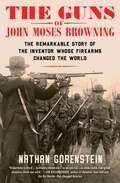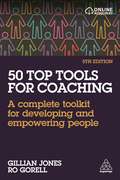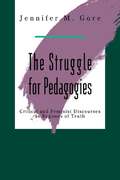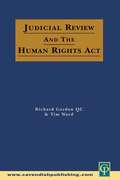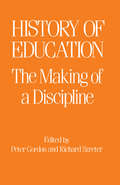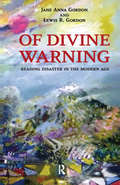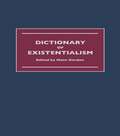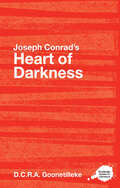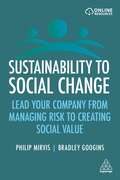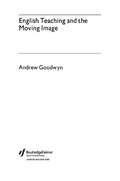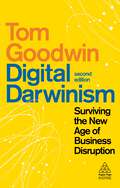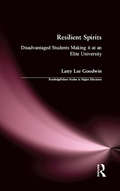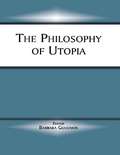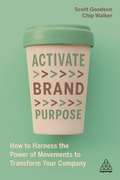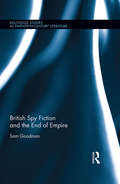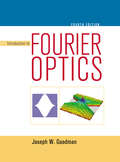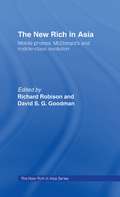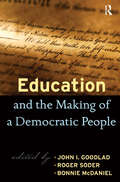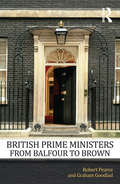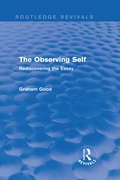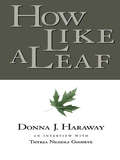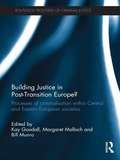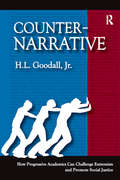Special Collections
Benetech’s Global Certified Accessible Titles
Description: Benetech’s GCA program is the first independent third-party EPUB certification to verify ebook accessibility. By creating content that is born accessible, publishers can meet the needs of all readers. Learn more: https://bornaccessible.benetech.org/
- Table View
- List View
Connections
by Wade Leuwerke and A. J. Metz and Paul GoreConnections is an innovative program, built from the ground up with a growth-mindset approach to college and career success. Written by counseling psychologists Paul Gore, Wade Leuwerke, and A.J. Metz, Connections shows students from day one how to be learners, whose mindset, drive, and strengths will help them meet any challenge on their way to college, personal, and career success. The expertly designed program is firmly rooted in the most current research in positive psychology, using self-reflection as a tool for goal-setting; goal-setting as a tool for imagining one's potential; and imagining one's potential as the motivation for realizing it. Connections puts students at the center of their own personalized learning path, facilitates their purposeful choice of an academic and career plan, and develops all the skills they need--cognitive and non-cognitive, academic and life--to foster their self-growth and success. Built around the most common issues faced in the classroom, LaunchPad for Connections, Second Edition gives students everything they need to prepare for class and exams, including author-developed digital tools linked directly to the eBook, the ACES student self-assessment (taken at the start and end of term), and our acclaimed LearningCurve adaptive quizzing. For instructors, LaunchPad offers everything they need to quickly set up a course, customize the content, prepare presentations and lectures, assign and assess homework, and guide the progress of individual students and the class as a whole.
The Guns of John Moses Browning
by Nathan GorensteinA &“well-researched and very readable new biography&” (The Wall Street Journal) of &“the Thomas Edison of guns,&” a visionary inventor who designed the modern handgun and whose awe-inspiring array of firearms helped ensure victory in numerous American wars and holds a crucial place in world history.Few people are aware that John Moses Browning—a tall, humble, cerebral man born in 1855 and raised as a Mormon in the American West—was the mind behind many of the world-changing firearms that dominated more than a century of conflict. He invented the design used in virtually all modern pistols, created the most popular hunting rifles and shotguns, and conceived the machine guns that proved decisive not just in World Wars I and II but nearly every major military action since. Yet few in America knew his name until he was into his sixties. Now, author Nathan Gorenstein brings firearms inventor John Moses Browning to vivid life in this riveting and revealing biography. Embodying the tradition of self-made, self-educated geniuses (like Lincoln and Edison), Browning was able to think in three dimensions (he never used blueprints) and his gifted mind produced everything from the famous Winchester &“30-30&” hunting rifle to the awesomely effective machine guns used by every American aircraft and infantry unit in World War II. The British credited Browning&’s guns with helping to win the Battle of Britain. His inventions illustrate both the good and bad of weapons. Sweeping, lively, and brilliantly told, this fascinating book that &“gun collectors and historians of armaments will cherish&” (Kirkus Reviews) introduces a little-known legend whose impact on history ranks with that of the Wright Brothers, Thomas Edison, and Henry Ford.
50 Top Tools for Coaching
by Ro Gorell and Gillian JonesFull of exercises, models, checklists and templates, this book covers how to assess the needs of clients, select the right tool for the circumstance and deliver effective coaching with confidence. A complete resource for both in-house and external coaches, 50 Top Tools for Coaching presents the techniques required for every coaching situation. It focuses on every stage of the coaching process, from setting up and managing the coaching relationship, understanding and resolving conflict, developing client confidence and performance to enhancing leadership styles and coaching during periods of change. Supporting hints and tips are found throughout to maximise the effectiveness and impact of the tools.This fully revised fifth edition of 50 Top Tools for Coaching includes new tools for managers for performance coaching and for building your own coaching practice. It remains an indispensable resource for coaches of all levels of experience and in all remits, as well as managers and leaders looking to improve performance in their organizations through coaching. Online supporting resources include additional tools, interactive templates and videos of the tools in action demonstrated by the authors.
The Struggle For Pedagogies
by Jennifer GoreFirst Published in 1993. Routledge is an imprint of Taylor & Francis, an informa company.
Judicial Review & the Human Rights Act
by Richard Gordon and Tim WardThe Human Rights Act 1998 had a profound effect on the law of the United Kingdom,and in no area more so than judicial review. This book gives practical guidance on the interplay between the Act and domestic public law.
The History of Education
by R. Szreter and Peter GordonThis volume deals with the great changes which have taken place in the practice of the history of education in present years. It brings together a number of important articles on the subject which are not easily available to the ordinary reader.
Of Divine Warning
by Lewis R. Gordon and Jane Anna GordonThis book offers a theory of disaster in modern and contemporary society and its impact on the construction of social and political life. The theory is premised upon what the authors call "the sign continuum," where disaster spreads across society through efforts to evade social responsibility for its causes and consequences. Phenomena generated by such efforts include the social manifestation of monstrosity (disastrous people and other forms of living things) and an emerging antipolitics in an effort to assert rule and order. A crucial development is the attack on speech, a fundamental feature of political life, as manifested by the increased expectations of categories of people whose containment calls for shunning and silence.
Dictionary of Existentialism
by Haim GordonExistentialism, as a philosophy, gained prominence after World War II. Instead of focusing upon a particular aspect of human existence, existentialists argued that our focus must be upon the whole being as he/she exists in the world. Rebelling against the rationalism of such philosophers as Descartes and Hegel, existentialists reject the emphasis placed on man as primarily a thinking being. Freedom is central to human existence, and human relations and encounters cannot be reduced simply to "thinking." This Dictionary provides--through alphabetically arranged entries--overviews of the various tenets, philosophers, and writers of existentialism, and of those writers/philosophers who, in retrospect, seem to existentialists to espouse their philosophy: Nietzsche, Kierkegaard, Dostoyevski, et al.
Joseph Conrad's Heart of Darkness
by D.C.R.A. GoonetillekeJoseph Conrad’s novella, Heart of Darkness, has fascinated critics and readers alike, engaging them in highly controversial debate as it deals with fundamental issues of good and evil, civilisation, race, love and heroism. This classic tale transcends the boundaries of time and place and has inspired famous film and television adaptations emphasising the cultural significance and continued relevance of the book. This guide to Conrad’s captivating novel offers: an accessible introduction to the text and contexts of Heart of Darkness a critical history, surveying the many interpretations of the text from publication to the present a selection of new essays and reprinted critical essays on Heart of Darkness, by Ian Watt, Linda Dryden, Ruth Nadelhaft, J. Hillis Miller and Peter Brooks, providing a range of perspectives on the novel and extending the coverage of key critical approaches identified in the survey section cross-references between sections of the guide, in order to suggest links between texts, contexts and criticism suggestions for further reading. Part of the Routledge Guides to Literature series, this volume is essential reading for all those beginning detailed study of Heart of Darkness and seeking not only a guide to the novel, but a way through the wealth of contextual and critical material that surrounds Conrad's text.
Sustainability to Social Change
by Philip Mirvis and Bradley GooginsIs your company using its talent to create social value? Or is it simply managing risks? To address the problems facing society and business today, sustainability is not good enough.Instead, companies need to do their part to lead social change. In Sustainability to Social Change, leadership and social innovation experts Philip Mirvis and Bradley K. Googins share their hands-on research to reveal how leaders can design and guide their companies to create more inclusive prosperity and become agents of social change. The book reveals the inside story of how socially innovative companies are making the strategic shift from minimizing risk to creating social value. It then outlines the strategies and practices that leaders can use to address the five biggest problems facing companies and society today: Purpose, Prosperity, Products, Planet and People. Filled with real life examples, hands-on guidelines and self-assessments to rate your company's performance, Sustainability to Social Change helps you pivot your company's mindset and practices in order to enhance society and the environment, and fuel its own success. Online resources include a guide to help employees become socially conscious, operate in a purposeful company, become allies for equity and social justice, add social value at work and establish "green" habits.
English Teaching and the Moving Image
by Andrew GoodwynAndrew Goodwyn's straightforward approach to teaching about the moving image de-mystifies this topic and shows how it can be easily incorporated into classroom practice. The first of its kind, this book builds on teachers' knowledge of teaching about advertising, newspapers and visual adaptations of literary texts, and provides practical advice and guidance on: * Adaptations: not just the film of the book* Teaching film* Teaching television* Practical work* New technologies and the moving audience. This jargon-free book will be a stimulating and useful guide to teachers and student teachers looking to improve their knowledge of the moving image and its recent arrival in secondary school teaching.
Digital Darwinism
by Tom GoodwinDisruption is back with a vengeance. If ever there was a time to learn how to adapt, grab opportunities and bounce back - it's now. Learn how to keep your business relevant, meet new customer expectations and leverage technology.Bestselling author and business influencer Tom Goodwin is back with this entirely revised new edition of Digital Darwinism. This book guides you through the unrelenting pace of change and uncertainty facing business leaders today. Currently in a hybrid world where digital and real-world experiences collide and are expected to seamlessly blend into one another, never has the need to be on top of your digital transformation been felt more strongly. With new expectations from customers and employees alike, how will your business grow and survive the future? Learn how to become truly customer-centric, drive digital transformation through a culture of real innovation and challenge assumptions of how things have been done before. The survival of your business depends on it.
Resilient Spirits
by Latty Lee GoodwinThis study explores the identity construction of socioeconomically and educationally disadvantaged students who enter an elite university. This critical ethnography gathered qualitative data about the twenty-three participants through non-participant observation, in-depth interviews, and focus groups. Faculty, staff, and administrators were also interviewed.
The Philosophy of Utopia
by Barbara GoodwinThis collection addresses the important function of utopianism in social and political philosophy and includes debate on what its future role will be in a period dominated by dystopian nightmare scenarios.
Activate Brand Purpose
by Scott Goodson and Chip WalkerBeing an active, purpose-driven brand has never been more meaningful. Recent statistics prove that more than 87% of consumers would purchase a product because a company advocated for an issue they cared about, and more than two-thirds would refuse to do so if the company supported an issue contrary to their beliefs. Become a truly 'purpose-driven' brand that creates action, with this proven framework. We live in an age of activism - the conscious consumer is more socially aware than ever before, and this is reflected in their buying habits. Yet, activism on behalf of brands is lagging. While many claim to be 'purpose driven', far too often this purpose is relegated to a plaque above the CEO's desk, and never goes any further. Or, worse, the 'purpose' is transparently used as a marketing ploy, but never acted upon in any real way. Activate Brand Purpose shows readers how to transform their brand's purpose into meaningful action by sparking a company wide cultural movement, beginning internally and permeating externally. Regardless of whether your purpose is lofty and socially conscious, or all business, consumers will respond if you can prove that you care about that purpose, and that you're working to realize it, rather than simply chasing the next dollar. This book contains a clearly explained, proven framework that will make this happen. Written by a veteran of the marketing and transformation industry, and the founder of the Movement Thinking and Movement Marketing crusade, Activate Brand Purpose is the definitive guide to this transformative approach to business growth.
British Spy Fiction and the End of Empire
by Sam GoodmanThe position of spy fiction is largely synonymous in popular culture with ideas of patriotism and national security, with the spy himself indicative of the defence of British interests and the preservation of British power around the globe. This book reveals a more complicated side to these assumptions than typically perceived, arguing that the representation of space and power within spy fiction is more complex than commonly assumed. Instead of the British spy tirelessly maintaining the integrity of Empire, this volume illustrates how spy fiction contains disunities and disjunctions in its representation of space, and the relationship between the individual and the state in an era of declining British power. Focusing primarily on the work of Graham Greene, Ian Fleming, Len Deighton, and John le Carre, the volume brings a fresh methodological approach to the study of spy fiction and Cold War culture. It presents close textual analysis within a framework of spatial and sovereign theory as a means of examining the cultural impact of decolonization and the shifting geopolitics of the Cold War. Adopting a thematic approach to the analysis of space in spy fiction, the text explores the reciprocal process by which contextual history intersects with literature throughout the period in question, arguing that spy fiction is responsible for reflecting, strengthening and, in some cases, precipitating cultural anxieties over decolonization and the end of Empire. This study promises to be a welcome addition to the developing field of spy fiction criticism and popular culture studies. Both engaging and original in its approach, it will be important reading for students and academics engaged in the study of Cold War culture, popular literature, and the changing state of British identity over the course of the latter twentieth century.
Avicenna
by L E Goodmanthe philosophers in the West, none, perhaps, is better known by name and less familiar in actual content of his ideas than the medieval Muslim philosopher, physician, minister and naturalist Abu Ali Ibn Sina, known since the days of the scholastics as Avicenna. In this book the author, himself a philosopher, and long known for his studies of Arabic thought, presents a factual account of Avicenna's philosophy. Setting the thinker in the context of his often turbulent times and tracing the roots and influences of Avicenna's ideas, this book offers a factual philosophical portrait. It details Avicenna's account of being as a synthesis between the seemingly irreconcilable extremes of Aristotelian eternalism and the creationism of monotheistic scripture. It examines Avicenna's distinctive theory of knowledge, his ideas about immortality and individuality, including the famous "floating man argument", his contributions to logic, and his probing thoughts on rhetoric and poetics.
Introduction to Fourier Optics
by Joseph GoodmanFourier analysis is a ubiquitous tool that has found application to diverse areas of physics and engineering. Goodman focuses on applications in optics, and in particular with applications to diffraction, imaging, optical information processing, holography, and optical communications. Goodman, Introduction to Fourier Optics satisfies the needs of several different types of Physics and Engineering courses. Directed towards both physicists and engineers this text is suitable for audiences focusing on applications of optics. A clear presentation makes this text work well as both a teaching resource and a reference book.
The New Rich in Asia
by Richard Robison and David S. G. GoodmanThis is the first volume in the The New Rich in Asia series which examines the economic, social and political construction of the 'new rich' in the countries and territories of East and South East Asia, as well as their impact internationally. From a western perspective the rise of the emergent business and professional class may seem very familiar. However, it is far from clear that those newly enriched by the processes of modernization in East and South East Asia are readily comparable with the middle classes of the West. For example, civil and human rights seem to play a different role in social, political and economic change, and the State is clearly more central as an agent of economic development. This volume is the essential introduction to the series, and identifies the 'new rich' phenomenon in Indonesia, Thailand, Singapore, Malaysia, Korea, China, Hong Kong and Taiwan. The contributors demonstrate that the key to understanding the 'new rich' is to realise that they are neither a single category or class, but in each setting a series of different socio-political groups who have a common inheritance from the process of rapid economic growth.
Education and the Making of a Democratic People
by Bonnie Mcdaniel and John I. Goodlad and Roger SoderUnfortunately, civic values such as equity and justice that constitute the moral grounding of American democracy are losing their place in public affairs. The promise of this democracy is inclusive: no one is to be left out. Yet many people are. Education and the Making of a Democratic People regards the challenge of inclusiveness as a fundamental and non-negotiable educational agenda. America's public schools are a main public forum in which people can learn to preserve and actively protect our democratic process. The value of our schools as a democratic forum extends beyond the classroom to parents and other members of local communities. By engaging in conversations and actions that support the democratic purpose of schools, local communities can ensure that the United States will become a healthy, robust democracy that represents all of its citizens.
British Prime Ministers From Balfour to Brown
by Robert Pearce and Graham GoodladThe origins of the post of Prime Minister can be traced back to the eighteenth century when Sir Robert Walpole became the monarch’s principal minister. From the dawn of the twentieth century to the early years of the twenty-first, however, both the power and the significance of the role have been transformed. British Prime Ministers from Balfour to Brown explores the personalities and achievements of those twenty individuals who have held the highest political office between 1902 and 2010. It includes studies of the dominant premiers who helped shape Britain in peace and war – Lloyd George, Churchill, Thatcher and Blair – as well as portraits of the less familiar, from Asquith and Baldwin to Wilson and Heath. Each chapter gives a concise account of its subject’s rise to power, ideas and motivations, and governing style, as well as examining his or her contribution to policy-making and handling of the major issues of the time. Robert Pearce and Graham Goodlad explore each Prime Minister’s interaction with colleagues and political parties, as well as with Cabinet, Parliament and other key institutions of government. Furthermore they assess the significance, and current reputation, of each of the premiers. This book charts both the evolving importance of the office of Prime Minister and the continuing restraints on the exercise of power by Britain’s leaders. These concise, accessible and stimulating biographies provide an essential resource for students of political history and general readers alike.
The Observing Self
by Graham GoodFirst published in 1988, this title is a study of the essay as a literary genre, not just in terms of its general intellectual and literary history, but as an exploration of the creative possibilities of the form. The rise of the essay is discussed in relation to the rise of the novel and the emergence of empiricism in science, but the main focus of Graham Good’s study is on the inner workings of the essay itself. Drawing on criticism by Adorno and Lukacs, Graham Good presents the genre as an expression of individualism, freed from tradition and authority, in which the self constructs itself and its object through independent observation. Through analysis of the work of such essayists as Montaigne, Bacon, Virginia Wolf, T. S. Eliot and George Orwell, the potential of the genre for independence and individualism is illustrated, and the essay is resituated as an intellectually challenging form of creative and critical writing.
How Like a Leaf
by Donna Haraway and Thyrza GoodeveThe author of four seminal works on science and culture, Donna Haraway here speaks for the first time in a direct and non-academic voice. How Like a Leaf will be a welcome inside view of the author's thought.
Building Justice in Post-Transition Europe?
by Margaret Malloch and Bill Munro and Kay GoodallAfter the collapse of the Berlin wall in 1989 and disintegration of the Soviet Union, scholars focused on the problems of legal transitions within the newly emerging democracies. Two decades on, these states are in ‘post-transition’ conditions; having undergone and continuing to experience political, economic and constitutional upheavals to varying degrees. This book provides an interdisciplinary perspective on this largely unexamined topic. Part I of the book sets the scene with a socio-historical overview and a theoretical chapter; both of which contextualise the book within current debates and provide the theoretical direction of the book as a whole. The later chapters set out contrasting perspectives and consist of themed essays on individual legal systems, investigating these through approaches ranging from socio-legal study to political economy. The book aims to refine important directions for the comparative conceptual study of criminal law policy and processes of criminalisation in emerging democratic states. The result is a significant contribution to the understanding of this subject in the fields of criminology, law, philosophy and political science. The book will appeal to academics, policy-makers and practitioners who are attempting to grapple with the area of "transitions" in the fields of criminology, law, philosophy and political science. As a distinctively interdisciplinary text, it brings together analysis of both the social processes of creating (and abandoning) criminal law and a philosophical reflection. The book provides a comprehensive and critical analysis which points to future directions in criminalisation in the emerging democratic states of Eastern Europe.
Counter-Narrative
by H.L. Goodall JrGoodall portrays a world caught up in the middle of a narrative arms race, where the message of the political right has outflanked the message of the political left. It is a world where narratives used by the far right inch ever closer to those employed by right-wing extremists in the Muslim world. Rather than dismiss the use of political narratives as a shallow tactic of the opposition, Goodall promotes their usefulness and outlines a number of ways that liberal academics can retake the public discourse from the extremist opposition. This is an essential text for the aspiring public intellectual and will appeal to students and scholars of qualitative methods, communications and media, and political science alike.
